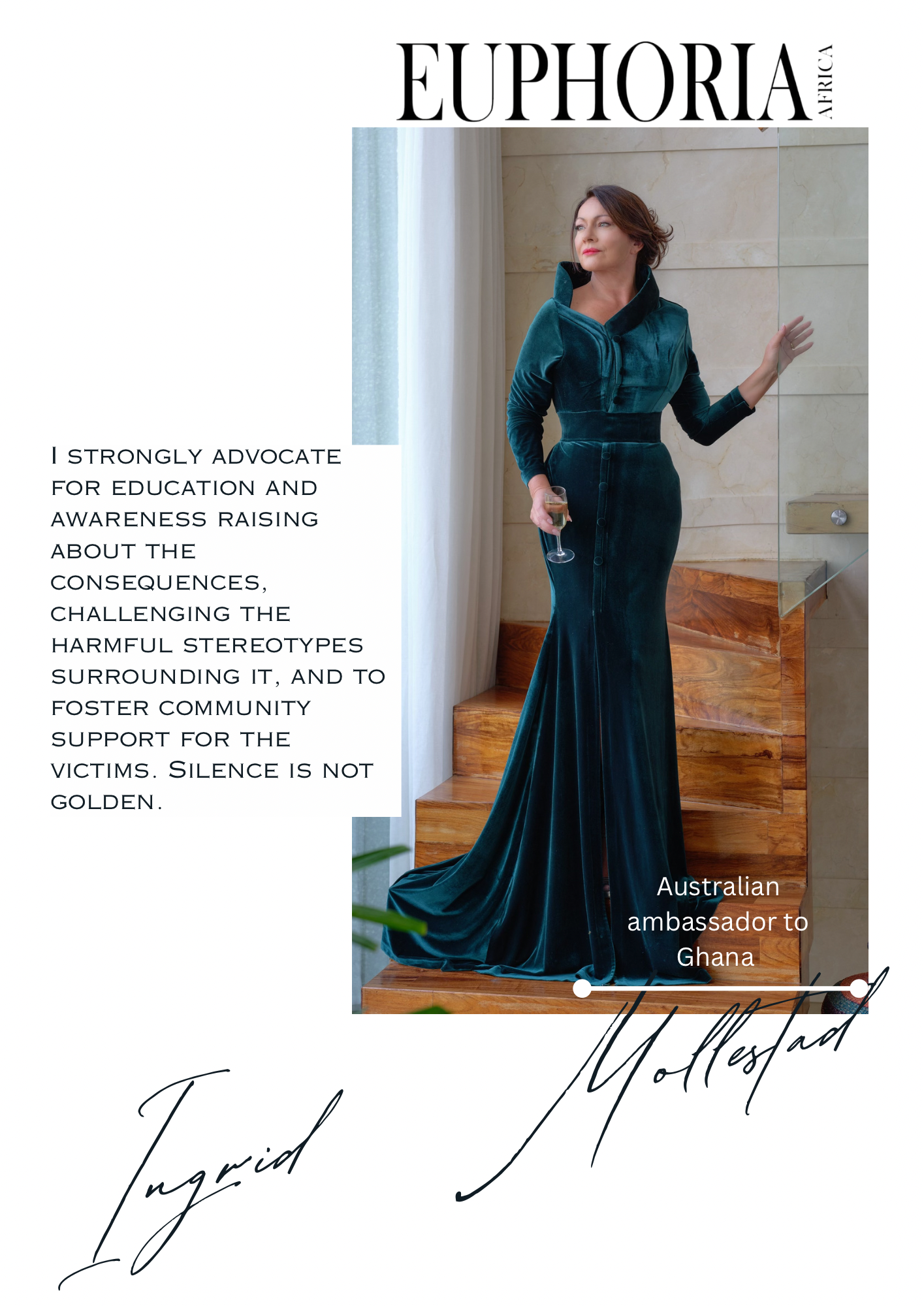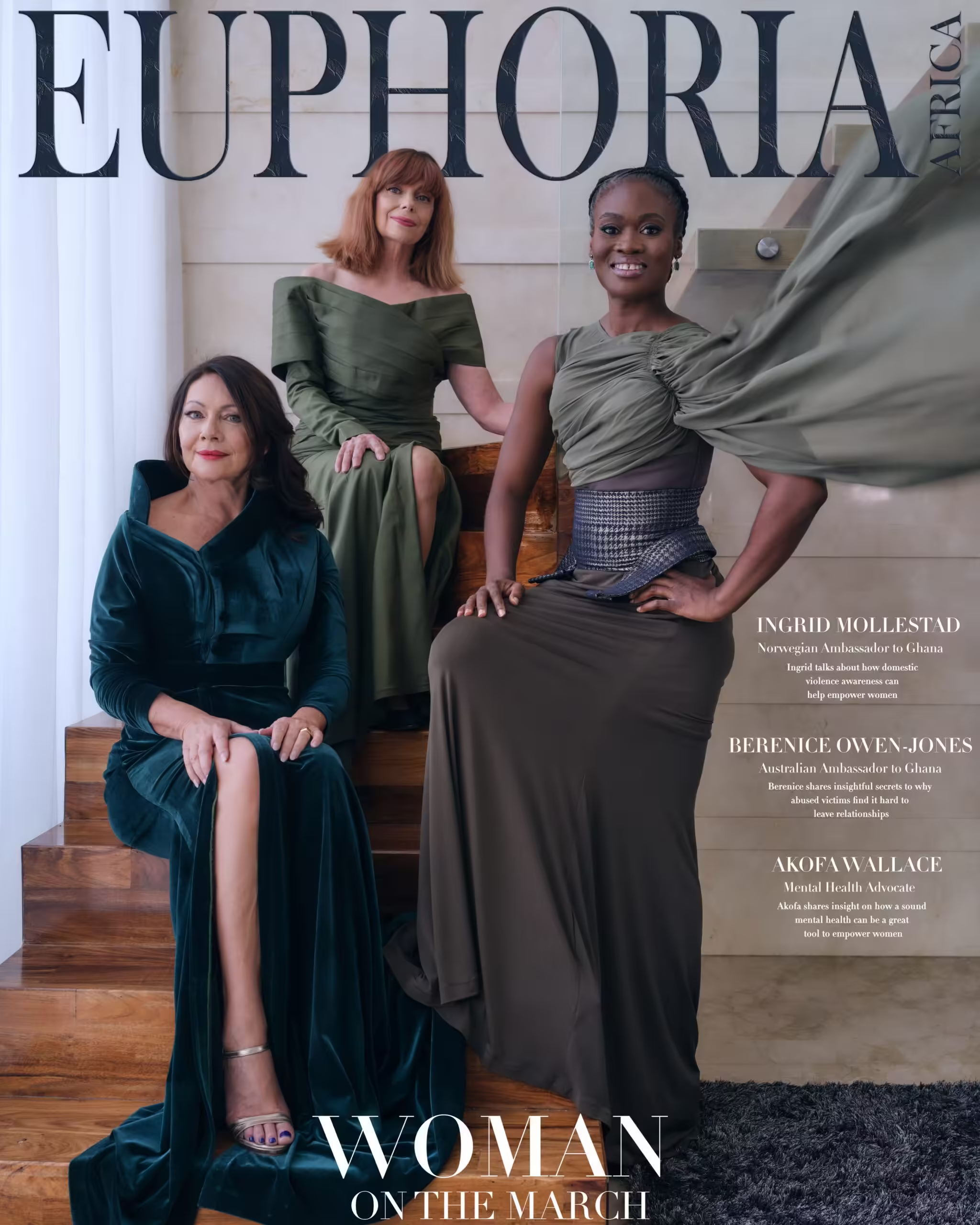Ingrid Mollestad: Norway’s Ambassador Advocates for Ghana

*How does Domestic Violence awareness help Empowerment of women?
In so many ways, I think. I think if women suffer domestic violence and abuse in their homes, where they are supposed to be safe, there is no way they can be in society and feel empowered and strong. Because suffering abuse from your loved ones – from your husband or your boyfriend – means that they are trying to belittle you, take your power away, and impose themselves on you. And I think a woman living in that kind of environment would be very worried, very afraid, and also cannot be herself. So when we say domestic violence is unacceptable, there is no situation in which a man should hit or punish his girlfriend, his wife or anyone. That message needs to be said loud and clear so that girls also stop feeling that it is the man’s right to treat them this way. And I think a woman, to be able to be herself and blossom in society, needs to be safe in her own home. And I think we as mothers – I have a son – are responsible for raising our sons so that they become respectful men and allow the women flourish. And there is absolutely no excuse for domestic violence.
*Sometimes abuse is disguised as or confused with love. How can someone know he or she is being manipulated to stay in an abusive relationship?
I know, I hear it often from young girls particularly, that “he loves me so he is possessive,” “he is jealous and he beats me because I don’t behave.” So what happens is that the woman thinks it is her own fault if she suffers from abuse. And somehow also, she thinks that a man who loves her needs to punish her or be jealous or possessive. I think that is such a big lie, and I think that if women start believing that they are, in a way, self-sabotaging. I think also that there are red flags. If you are in a relationship as a young woman and you encounter a boy or a man who is possessive, wants to control you, maybe you want to limit the number of friends you spend time with, then you need to know deep down that something is wrong. Something is wrong when you do not feel relaxed nor happy, and you cannot be yourself. And that is manipulation, and manipulation in itself is actually abuse. So I know a lot of young women who feel that they have to live up to some standard, and that in a passionate relationship there is jealousy and possessiveness and violence. It is also not true. That is not love at all!
*Is it advisable for parents to talk to their children about relationships and boundaries? How early can they have these discussions?
Well, I think one should start very, very early. I think as a mother of a boy, as I mentioned, all parents need to start talking with their children’s values early on when they are toddlers – to tell them “This is your body, you own it, you have the right to say no, nobody can touch you, nobody can hit you.” And establish a relationship of confidence with your child, so that she is always able to come home and explain if something wrong is going on. And also talking to our children, we raise adults in the future generations to come, who will behave as responsible adults and loving partners. So very early in kindergarten, the children should know that you do not have to sit on somebody’s lap, you do not have to allow yourself to be touched. All of these should be talked about very honestly and openly from the small childhood.

*How does your country address and combat domestic violence within its own borders? What are some strategies she employs to raise awareness?
Domestic and gender-based violence are a huge challenge across the globe. Norway addresses and combats domestic violence nationally through a comprehensive approach involving various measures and initiatives. The government provides funding for shelters, and crises centers, and provides support services for victims of domestic violence around the country, just to mention a few. Domestic violence was made a significant priority in the state budget this year. The government dedicated funds to establish separate “domestic violence sections” in three police districts around the country. Strong legal frameworks prioritize victim protection, while gender equality initiatives are integrated into policy-making.
Research informs evidence-based interventions, reflecting Norway’s commitment to creating a society free from violence and discrimination. Three months ago – on 20th December 2023 – the Norwegian government re-launched an escalation plan against domestic violence for the period 2024 – 2028, with over a hundred concrete measures. Norway also takes a comprehensive and integrated approach to raising awareness about domestic violence, gender-based violence and gender equality. Education at all levels, public awareness campaigns, and a robust support system including shelters and legal aid are key components.
*Are there specific programs or initiatives implemented by your embassy in Ghana to support victims of domestic violence, and how do we collaborate with local authorities and organizations in Ghana?
Promoting women’s rights and empowerment, and ending all forms of gender-based violence, including female genital mutilation and child marriage, lies at the core of the Norwegian development policies. Norway has taken a global lead on the issue of combating gender-based violence and is one of the main contributors to international organizations such as UN Women, UNFPA, and UNICEF, and in 2019 we hosted an international conference in Oslo on the topic. Enhancing awareness of sexual and gender-based violence, and improving support for survivors of such violence, are priority areas of Norway’s development agenda everywhere. Globally, and in Ghana, we partner with organizations working towards progress in ending gender-based violence and supporting victims of domestic violence. UNFPA and UNICEF are two examples of the most significant partners for Norway, also for Ghana. They work closely with local authorities and partners in Ghana to address gender-based violence, including through education that challenges harmful stereotypes, protecting women’s rights, and support systems that empower survivors to rebuild their lives. I have had the opportunity to travel to different parts of Ghana and other countries in the region, to talk to local authorities, and to participate in inspiring dialogues between youth – both boys and girls – and local and traditional leaders to challenge harmful practices and gender stereotypes. To truly change negative stereotypes and behaviours, and in some cases a culture of oppression, we have to engage young people. Gender-based violence effects girls physically and mentally, but is equally detrimental to boys and men and naturally the society as a whole. Such meetings and dialogues are truly inspiring to be part of.

*In your opinion, what are the key challenges or barriers faced in effectively addressing domestic violence, and how can international cooperation play a role in overcoming them?
Key challenges in addressing domestic violence include; lack of awareness, social stigma, cultural norms as well as resource constraints, and legal and policy issues.
International cooperation can help by sharing best practices, building capacity, advocating for change, harmonizing legal frameworks, and facilitating research and data sharing, key to putting the right policies in place. It is key to raise awareness about the cost of domestic and gender-based violence for society as a whole. Norway participates in international efforts to combat domestic violence, including ratifying and implementing international conventions and agreements aimed at preventing and addressing violence against women and domestic violence, and is a major donor to international organizations that have this on top of their agenda.
Addressing domestic violence poses numerous challenges and barriers, including social stigma that prevents victims from seeking help, or even talking about or reporting abuse due to fear of judgment or retaliation, as well as a lack of awareness among individuals, including victims, perpetrators, and bystanders. A culture of “silence and normalization,” a tendency to see this as a “family affair,” and a lack of understanding of the negative impacts of domestic violence on women, men, and children (and of course, society as a whole) leads to underreporting and inadequate responses and often perpetuates this type of violence. Therefore, I strongly advocate for education and awareness creation about the consequences, challenging the harmful stereotypes surrounding it, and to foster community support for the victims. Silence is not always golden.


